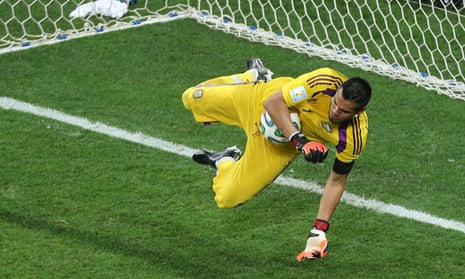Forget the Hand of God. The hordes of Argentinians expected to pour into Rio de Janeiro for Sunday’s final are hoping that the Hands of God will close around the World Cup.
He barely played any club football in France last season but Sergio Romero will line up against a fearsome German attack on Sunday as an integral part of a defence that will have to be fully on its mettle.
Romero’s penalty saves against Holland earned him the man of the match award and the Diego Maradona-inspired sobriquet from the Argentinian press. One of the first people he spoke to afterwards was the Holland manager, Louis van Gaal.
“I thanked Louis in the dressing room,” said Romero, who moved to Van Gaal’s AZ Alkmaar from Racing Club de Avellaneda in Argentina in 2007. It was a purple patch for both player and manager as Van Gaal rebuilt his reputation following a troubled second spell at Ajax and Romero established himself in the international side.
“I taught Romero how to stop penalties, so that hurts,” said Van Gaal afterwards. “We were the club to bring him to Europe. He was a big talent, and someone who has the qualities to do that.”
In turn Romero, who saved penalties from Ron Vlaar and Wesley Sneijder after consulting notes prepared beforehand, was effusive in his praise for both Van Gaal and his national coach, Alejandro Sabella.
“He helped me a lot when I arrived in Holland, a completely different country with customs and language,” he said. “I didn’t understand a word, but he spoke Spanish – so I’m grateful to both these managers for what they’ve done for my career. The truth is Mr Van Gaal teaches the players a lot.”
During AZ’s championship winning season in 2008-9 he once went 950 minutes without conceding a goal. Romero subsequently was chosen by Maradona as Argentina’s first-choice goalkeeper, playing all five matches in 2010 until they were hammered 4-0 by Germany at the quarter-final stage. Romero, who signed for Sampdoria in 2011, said he was “relaxed” about the prospect of facing the same opposition again in Sunday’s final.
“That [4-0 defeat] was a hard blow, especially after a World Cup in which we played well but, on that day, nothing came off for us,” he said. “Today, four years have passed and we hope to do things better than we did that day. We’ve grown a lot. From the first game, there’s been criticism and the team has changed, but the team puts their lives on to that pitch, they kill for each other.”
In a defining characteristic for many of the players on both sides in Sunday’s final, and indeed most of the teams that have succeeded in Brazil, Romero came through the system together with his team-mates. He represented Argentina at the 2007 Under-20 World Cup before graduating to the senior side. Romero signed for Monaco on loan at the beginning of last season but spent all year behind the Croatian Danijel Subasic in the pecking order.
He played just three matches, all towards the end of the campaign, and never finished on the winning side. He has now played more matches at the World Cup than he managed in Ligue 1.
But Sabella, who has proved loyal to those players that he trusts, stuck with Romero and is now reaping the benefits. The goalkeeper said he wanted to “give something back” to the manager who had stood by him.
“We all grow. I feel I grew, in this time that has been difficult for me. All the staff, all the players, they all backed me. So, when the game finished, they all came over to embrace me because it was a difficult year.”
With Martín Demichelis brought in to the centre of defence and Javier Mascherano performing outstandingly in a holding midfield role, Argentina look a far less porous proposition than they did earlier in the tournament.
Romero had barely anything to do during open play, with Holland’s first shot on target not coming until eight minutes into extra time, but was alert to save the Oranje’s first and fourth penalties.
“I knew a little bit how they take them but the penalties always change. The reality is there are very few players who always go the same place, you could see it with Robben. Against Costa Rica, he went one side; tonight, he went the other,” he said. “Also, intuition helps you a lot. It helped me, where I felt it would go to the left and it did.”
Asked whether it was the finest moment of his career, he said: “Absolutely, especially after a tough year for me, after not playing so much. The truth is I leave tonight delighted, all my team-mates are delighted, that’s the important thing.”
Argentina will have to recover fast from a bruising semi-final that left several of the side hobbling through the mixed zone and Pablo Zabaleta nursing a nasty blow to the mouth. Sabella said afterwards his players were “sore, beaten, tired as a result of a war” and Lucas Biglia said afterwards the players were “very, very tired”. But the midfielder said that they would regroup before Sunday’s final. “What’s important is us going about our jobs and making the sacrifices, and we’ll see what happens.”
He admitted Germany were “very good” against Brazil but suggested that Argentina’s superior organisation and discipline would give them a sterner test. “They played a fantastic semi-final but, well, football has other things.”
